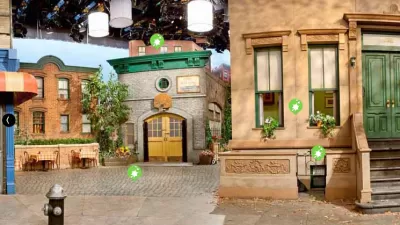As social media platforms evolve into specific niches, the Nextdoor platform is quickly expanding its online version of neighborhood-level interaction.

Mike Isaac reports on the expanding reach of Nextdoor—a San Francisco-based social networking start-up aimed at building community.
According to Isaac, "[investors] think Nextdoor is on to something. The company will announce on Wednesday that it has raised $110 million in venture capital from investors like Redpoint Ventures and Insight Venture Partners. The new investment values the three-and-a-half-year-old start-up at about $1.1 billion, putting the company among the sharply rising number of tech start-ups with 10-figure valuations."
Isaac adds that the investments indicate an interest in small (i.e., neighborhood-sized) communities. And neighborhoods are Nextdoor's niche. "Nextdoor has slowly built a network of more than 53,000 microcommunities across the United States, all based on local neighborhood boundaries. Nextdoor restricts communication to only those people who live close to one another; users are required to verify their identity and home address upon signing up," writes Isaac. Planetizen described Nextdoor as the "Facebook for neighborhoods" in April of 2014.
A day after Isaac's article was published, Oklahoma City announced that it had adopted a municipal profile on Nextdoor, to join the 200-plus neighborhoods in the city already using the social media platform. The city intends to use Nextdoor as a community engagement tool for the sharing of information in both directions.
FULL STORY: Nextdoor Social Network Digs Deep Into Neighborhoods

Maui's Vacation Rental Debate Turns Ugly
Verbal attacks, misinformation campaigns and fistfights plague a high-stakes debate to convert thousands of vacation rentals into long-term housing.

Planetizen Federal Action Tracker
A weekly monitor of how Trump’s orders and actions are impacting planners and planning in America.

Chicago’s Ghost Rails
Just beneath the surface of the modern city lie the remnants of its expansive early 20th-century streetcar system.

Bend, Oregon Zoning Reforms Prioritize Small-Scale Housing
The city altered its zoning code to allow multi-family housing and eliminated parking mandates citywide.

Amtrak Cutting Jobs, Funding to High-Speed Rail
The agency plans to cut 10 percent of its workforce and has confirmed it will not fund new high-speed rail projects.

LA Denies Basic Services to Unhoused Residents
The city has repeatedly failed to respond to requests for trash pickup at encampment sites, and eliminated a program that provided mobile showers and toilets.
Urban Design for Planners 1: Software Tools
This six-course series explores essential urban design concepts using open source software and equips planners with the tools they need to participate fully in the urban design process.
Planning for Universal Design
Learn the tools for implementing Universal Design in planning regulations.
planning NEXT
Appalachian Highlands Housing Partners
Mpact (founded as Rail~Volution)
City of Camden Redevelopment Agency
City of Astoria
City of Portland
City of Laramie




























